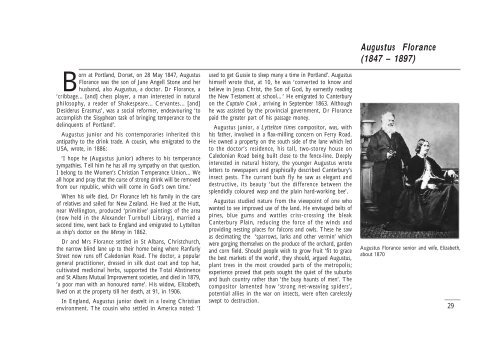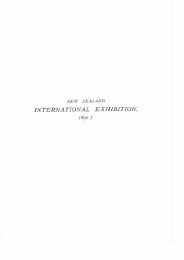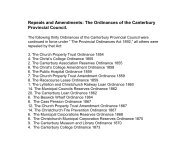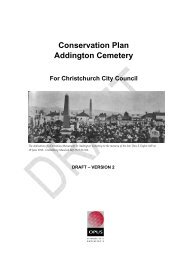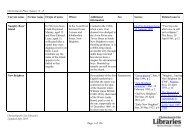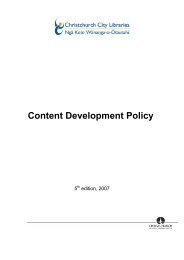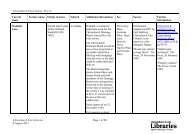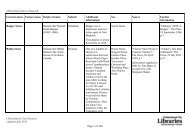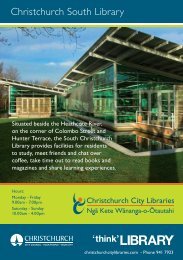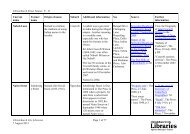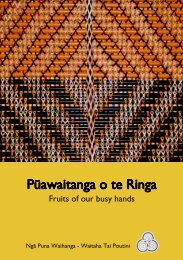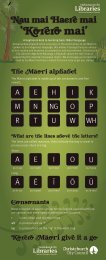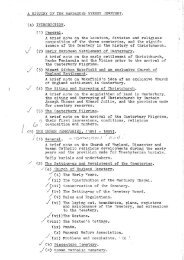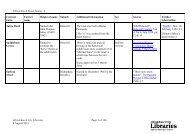Rich man, poor man, environmentalist, thief - Christchurch City ...
Rich man, poor man, environmentalist, thief - Christchurch City ...
Rich man, poor man, environmentalist, thief - Christchurch City ...
Create successful ePaper yourself
Turn your PDF publications into a flip-book with our unique Google optimized e-Paper software.
Born at Portland, Dorset, on 28 May 1847, Augustus<br />
Florance was the son of Jane Angell Stone and her<br />
husband, also Augustus, a doctor. Dr Florance, a<br />
‘cribbage... [and] chess player, a <strong>man</strong> interested in natural<br />
philosophy, a reader of Shakespeare... Cervantes... [and]<br />
Desiderus Erasmus’, was a social reformer, endeavouring ‘to<br />
accomplish the Sisyphean task of bringing temperance to the<br />
delinquents of Portland’.<br />
Augustus junior and his contemporaries inherited this<br />
antipathy to the drink trade. A cousin, who emigrated to the<br />
USA, wrote, in 1886:<br />
‘I hope he (Augustus junior) adheres to his temperance<br />
sympathies. Tell him he has all my sympathy on that question.<br />
I belong to the Women’s Christian Temperance Union... We<br />
all hope and pray that the curse of strong drink will be removed<br />
from our republic, which will come in God’s own time.’<br />
When his wife died, Dr Florance left his family in the care<br />
of relatives and sailed for New Zealand. He lived at the Hutt,<br />
near Wellington, produced ‘primitive’ paintings of the area<br />
(now held in the Alexander Turnbull Library), married a<br />
second time, went back to England and emigrated to Lyttelton<br />
as ship’s doctor on the Mersey in 1862.<br />
Dr and Mrs Florance settled in St Albans, <strong>Christchurch</strong>,<br />
the narrow blind lane up to their home being where Ranfurly<br />
Street now runs off Caledonian Road. The doctor, a popular<br />
general practitioner, dressed in silk dust coat and top hat,<br />
cultivated medicinal herbs, supported the Total Abstinence<br />
and St Albans Mutual Improvement societies, and died in 1879,<br />
‘a <strong>poor</strong> <strong>man</strong> with an honoured name’. His widow, Elizabeth,<br />
lived on at the property till her death, at 91, in 1906.<br />
In England, Augustus junior dwelt in a loving Christian<br />
environment. The cousin who settled in America noted: ‘I<br />
used to get Gussie to sleep <strong>man</strong>y a time in Portland’. Augustus<br />
himself wrote that, at 10, he was ‘converted to know and<br />
believe in Jesus Christ, the Son of God, by earnestly reading<br />
the New Testament at school…’ He emigrated to Canterbury<br />
on the Captain Cook , arriving in September 1863. Although<br />
he was assisted by the provincial government, Dr Florance<br />
paid the greater part of his passage money.<br />
Augustus junior, a Lyttelton times compositor, was, with<br />
his father, involved in a flax-milling concern on Ferry Road.<br />
He owned a property on the south side of the lane which led<br />
to the doctor’s residence, his tall, two-storey house on<br />
Caledonian Road being built close to the fence-line. Deeply<br />
interested in natural history, the younger Augustus wrote<br />
letters to newspapers and graphically described Canterbury’s<br />
insect pests. The currant bush fly he saw as elegant and<br />
destructive, its beauty ‘but the difference between the<br />
splendidly coloured wasp and the plain hard-working bee’.<br />
Augustus studied nature from the viewpoint of one who<br />
wanted to see improved use of the land. He envisaged belts of<br />
pines, blue gums and wattles criss-crossing the bleak<br />
Canterbury Plain, reducing the force of the winds and<br />
providing nesting places for falcons and owls. These he saw<br />
as decimating the ‘sparrows, larks and other vermin’ which<br />
were gorging themselves on the produce of the orchard, garden<br />
and corn field. Should people wish to grow fruit ‘fit to grace<br />
the best markets of the world’, they should, argued Augustus,<br />
plant trees in the most crowded parts of the metropolis;<br />
experience proved that pests sought the quiet of the suburbs<br />
and bush country rather than ‘the busy haunts of men’. The<br />
compositor lamented how ‘strong net-weaving spiders’,<br />
potential allies in the war on insects, were often carelessly<br />
swept to destruction.<br />
Augustus Florance<br />
(1847 – 1897)<br />
Augustus Florance senior and wife, Elizabeth,<br />
about 1870<br />
29


